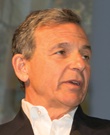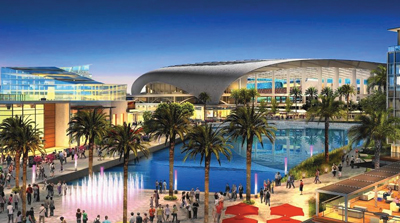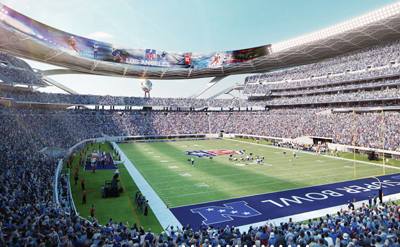NFL owners gather this week in Houston to discuss and perhaps vote to relocate a team for the first time in more than two decades. Twenty-four owner votes (out of 32) are needed for one of the competing proposals from the St. Louis Rams and from the San Diego Chargers and Oakland Raiders together, and it is possible neither reaches that threshold. But it is also possible some kind of permutation emerges that’s not even on the table at the moment.
Below is a look at possible outcomes (and one possibility that’s all but impossible*), including some of the pros and cons of each and the likelihood of each scenario.
Outcome 1: Rams approved for relocation
 |
KROENKE
|
Pros: Rams owner Stan Kroenke has the deepest pockets of the Los Angeles contenders, and his proposed stadium site in Inglewood has long been a desired spot for the NFL, in part because it is closest of the two sites to downtown Los Angeles. The Rams also are already in the NFC West, so divisional realignment would be unnecessary. Some of the Rams’ relocation fee may be set aside to aid the Chargers and Raiders in their home markets.
Cons: The city of St. Louis has the most advanced stadium proposal of the cities working to keep their teams. Approving the club’s relocation would not appear to meet the spirit of the NFL’s relocation bylaws, and it might send the signal to other municipalities that the league does not care when a city and state work hard to keep a team. In addition, of the three teams that want to move, the Rams play in what is considered the best of those three venues. That leaves San Diego and Oakland stuck in the oldest venues in the league. Also, while the Rams and their developer minimize the Federal Aviation Administration notice that the stadium is a hazard for nearby Los Angeles International Airport (SportsBusiness Journal, Jan. 4-10 issue), litigation and delay could sprout.
Chances: Kroenke clearly does not have the 24 necessary votes going into the meeting, so it is hard to see a path where the team relocates solo.
Outcome 2: Raiders and Chargers approved for relocation
 |
IGER
|
Pros: The move instantly solves the two current stadium problems in California and keeps those clubs from relocating out of the state. Two teams also deliver twice the relocation fee (estimated between $500 million and $600 million in present day dollars, per club) to the other 30 teams. And Walt Disney Chairman and CEO Bob Iger would come aboard to run the Carson project, a high-profile get for the NFL. In this scenario, some of the relocation fee may be diverted to help the Rams in St. Louis.
Cons: Many owners are wary about the Raiders and whether to entrust them with the vital Los Angeles market. Many owners also believe only one team — at least, only one team at a time — should move to Los Angeles. And divisional realignment may be necessary in this case, with both teams currently in the same division but moving into a shared stadium. Additionally, this outcome moves the teams in the two strongest economic markets in question, leaving the Rams in the market that’s seen as weakest, relatively speaking.
Chances: This two-team project is far closer to 24 votes than its rival but it may not have enough to cross the goal line. If it were to come down to just the current iteration of Carson vs. Inglewood, and owners decide they can’t leave this week’s meeting without a vote, Carson would come out on top.
Outcome 3: Only the Chargers approved for relocation
Pros: The Raiders and their NFL internal political baggage stay in Oakland, which is a growing economic market the NFL might not want to abandon anyway. In this scenario, some of the relocation fee is used to help the Raiders in Oakland, though there may be a path for them to come to Los Angeles down the road.
Cons: The Chargers have said they can afford the $1.8 billion stadium on their own. Still, that is a heavy lift for a team that is, based on some polls, the least popular in Los Angeles of the three. And does Iger stay in the project if there is only one team? Also, the Chargers and Raiders are contractually bound, so the Chargers may not be able to separate themselves from the Raiders at this point. And even if they could, there’s a preferred option to this solo outcome (as you’ll read below).
Chances: For this to happen, money needs to shift to Oakland to get the Raiders to end their Carson contract and start them on their way to a new stadium in Oakland. This remains a possibility.
Outcome 4: Rams and Chargers in Inglewood
 |
The Inglewood site has long been a desired spot for the NFL.
Photo by: HKS ARCHITECTS
|
Pros: This is the negotiated settlement many within league circles dream of. The Chargers would get 50 percent of the stadium, though none of the surrounding development. The move solves many of the owners’ worries: no Raiders; it rewards Chargers Chairman Dean Spanos for his years of frustration in San Diego; and brings in a deep-pocketed owner in Kroenke.
Cons: It puts two teams not on similar footing in the same building, with the Rams controlling all the ancillary development. Ask the New York Jets how they liked being the junior to the Giants for 25 years in the Meadowlands.
Chances: This has been talked about for more than a year, but for it to happen, someone has to get Spanos and Kroenke to break bread. The two are barely, if at all, on speaking terms. It also is unlikely Spanos, whose family business outside of football is in development, would agree to a deal in which he is not allowed to develop but his “partner” is. Still, if the NFL decides this is the best case, it could bring great pressure on the two teams to make it work.
Outcome 5: Rams and Chargers in Carson
 |
The two-team project in Carson is closer to 24 votes than its rival plan.
Photo by: MANICA |
Pros: The move might make a Spanos-Kroenke pairing easier with a true 50-50 partnership in this venture.
Cons: If the owners are going to approve a Chargers-Rams pairing, why do it in Carson, which is not viewed as the more lucrative of the two sites?
Chances: Slim. Kroenke wants Inglewood and wants to develop the land around the site. Carson is largely just a football stadium.
Outcome 6: No vote taken, but a new meeting is scheduled within a month or so
Pros: This outcome shows owners are intent on solving the L.A. issue even if in their first attempt the support doesn’t exist to see a vote through.
Cons: It becomes more difficult for a team that eventually relocates to market itself in Los Angeles if the approval is delayed but still proceeds for this fall. Also, the relocation subject is not removed from the NFL’s storylines as the league tries to celebrate the 50th Super Bowl next month.
Chances: Possible, if not quite likely. The dizzying array of issues and politics suggests a stalemate, but owners and the league office really wish to finally get this done.
Outcome 7: No relocation, and the issue is shelved until later in the year
Pros: If no project can draw 24 owner votes in favor, that means the rules worked and shows that the league does not take relocation lightly. It also gives the city of San Diego a new chance to retain the Chargers, with a June vote scheduled on a referendum to provide public funds for a new stadium.
Cons: Another lame-duck year beckons for the three home markets, and the endless NFL/L.A. return story plows on.
Chances: It’s hard to envision the NFL letting all three teams return, tails tucked between their legs, to their current home markets.
* Technically, there is also this possibility: Only the Raiders move. But with Raiders management not viewed favorably by many in the league, and the team having the fewest resources of the three involved clubs, this outcome is better characterized as a virtual impossibility.







